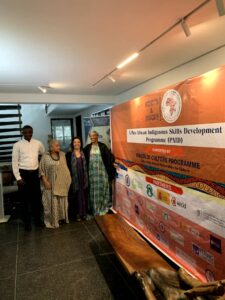By: Tijani Salako.
The Centre for Black and African Arts and Civilisation (CBAAC) on Tuesday launched the Pan-African Indigenous Skills Development Programme (PAID), a grant-backed initiative supported by the European Union National Institutes for Culture (EUNIC), aimed at empowering young creatives across Africa including Nigeria to preserve the continent’s cultural heritage through indigenous knowledge and design thinking, rooted in the concept of “roots and roofs.”
The Director General of CBAAC Hajia Aisha Adamu disclosed this at a press conference held in Lagos in collaboration with European Union National Institutes for Culture (EUNIC), Goethe Institutes, Nigeria Cluster and other local partners has part of the spaces of culture programme of European Union, highlighting its objectives and developmental contribution across Africa drew key stakeholders from creative industry, diplomatic and academic sector.
The Director General, Hajia Adamu while given her opening remark, noted that the PAID project is one out of seven initiatives project selected from 36 applicants across Africa under the EU-Africa Spaces of Culture 2025 framework, which comes with a grant of €50,000 to be jointly administered by CBAAC and other implementing partners. This will support the implementation of the PAID program.

She stressed that PAID is a groundbreaking initiative designed to revitalise and safeguard Africa’s indigenous architectural and artistic traditions while empowering a new generation of creative innovators. It stands as a model for equitable African-European cultural partnerships.
The program tends to equip young Africans with hands-on training in indigenous architectural design thinking, sustainable practices, and cultural representation through workshops, apprenticeships, and community-based projects, as participants will explore the intersection between built environments, storytelling, and performance.
Meanwhile the PAID project is directly aligned with President Bola Ahmed Tinubu’s national priorities of job creation and human capital development. It transforms traditional knowledge into modern economic opportunities and builds new models of cross-cultural partnerships rooted in mutual respect, shared learning, and collaboration.
However, the Africans are rich in resources and cultural assets. We have textiles, pottery, bronze works, traditional iron works as all of these are slowly being lost or misrepresented in translation. So, we decided to focus on people who already possess foundational skills and equip them with what we call “African Creative Design Thinking.”
This led to the creation of the Pan-African Indigenous Skills Development (PAID) Program. With the theme for the 2025 edition “African-Inspired Interior and Exterior Architecture.” The idea is to bridge design, culture, and sustainable practices.
The DG noted that “the journey began when we learned about the European Union’s Spaces of Culture grant. It was a last-minute submission, but we received incredible support from our collaborators, including the Irish Embassy, the National Troupe of Nigeria, and the Institute of African Diaspora Studies. Together, we came up with the concept of connecting “Roots and Roofs” with roots representing African cultural identity, and roofs symbolising architecture.
“But here in Africa, we have increasingly copied and imported designs from elsewhere, to the detriment of our indigenous creative expressions. This erodes the distinctiveness of our environments and undermines our cultural identity.
“We also considered the thought process behind design and creativity. The truth is, Africa has lost its voice in many of these areas. One of the first things you notice when you enter a new community apart from its tourist attractions is its architecture design which often communicates the identity. It tells you whether you’re in Spain, South Africa, Lagos, or Nairobi.
“The PAID initiative supports Nigeria’s cultural promise, the African Union’s Agenda 2063, and the United Nations Sustainable Development Goals (SDGs) the program will engage young Nigerians between the ages of 25 and 35 from all 36 states and the FCT as It emphasises inclusivity, gender balance, and regional diversity. Meanwhile, participants will undergo intensive training that blends ancestral wisdom with contemporary innovation, leading to community-led projects that foster rural development, cultural entrepreneurship, and heritage preservation.” The director general concluded.